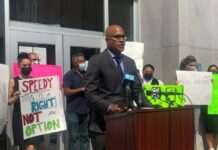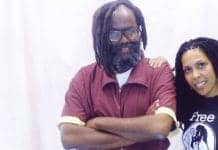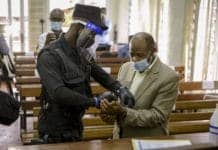by Ann Garrison

Dr. Léopold Munyakazi was deported to Rwanda early this morning. Immigration attorney Ofelia Calderón defended the gentle professor pro bono from the time of his arrest in 2009 to the 4th Circuit Court of Appeals, where she gave oral argument earlier this year.
The linguist, scholar and former French professor at Goucher College was arrested shortly after giving several lectures at Northeastern University college campuses in which he said that the Rwandan war of the 1990s was a class conflict, not an ethnic conflict, and that it was therefore incorrectly characterized as genocide. Hutus and Tutsis, he said, are not properly understood as ethnicities, but as historical social classes. They share the same language and culture, eat the same food, and marry each other, and the vast majority are Christian.
Dr. Léopold Munyakazi was deported to Rwanda early this morning.
Although Munyakazi was arrested shortly after giving his controversial talks, anonymous witnesses soon appeared to accuse him of genocide crime in Rwanda in 1994. These accusations were made over 10 years after the genocide and despite the fact that Dr. Munyakazi had been a free man in Rwanda before emigrating to the United States.
Christine Frechard, Dr. Munyakazi’s friend in Pittsburgh, Pennsylvania, said that she was able to speak to him on the phone before he boarded the plane and that he remained in good spirits. Responding to her distress, she said, he told her not to worry, that it was going to be all right and that he remained committed to his truth. Frechard said that she is contacting Amnesty International, the International Red Cross and foreign embassies in Kigali to ask them to keep watch over Léopold’s welfare in custody.
Although Munyakazi was arrested shortly after giving his controversial talks, anonymous witnesses soon appeared to accuse him of genocide crime in Rwanda in 1994.
Dr. Munyakazi joins three other celebrated political prisoners in Rwanda. They are Victoire Ingabire, who attempted to run against President Paul Kagame in 2010, Deo Mushayidi, the former president of the Rwandan Journalists Association, and Kizito Mihigo, a popular Rwandan gospel singer who recorded a song in which he sang that members of both groups, Hutu and Tutsi, were victimized in the Rwandan war and that both must be remembered in order for Rwandans to heal. Mihigo was arrested shortly after making the recording and sentenced to 10 years for plotting to murder the president and bring down the Rwandan government.
Oakland writer Ann Garrison writes for the San Francisco Bay View, Black Agenda Report, Black Star News, Counterpunch and her own website, Ann Garrison, and produces for AfrobeatRadio on WBAI-NYC, KPFA Evening News, KPFA Flashpoints and for her own YouTube Channel, AnnieGetYourGang. She can be reached at anniegarrison@gmail.com. In March 2014 she was awarded the Victoire Ingabire Umuhoza Democracy and Peace Prize for promoting peace in the Great Lakes Region of Africa through her reporting.

 Store
Store












